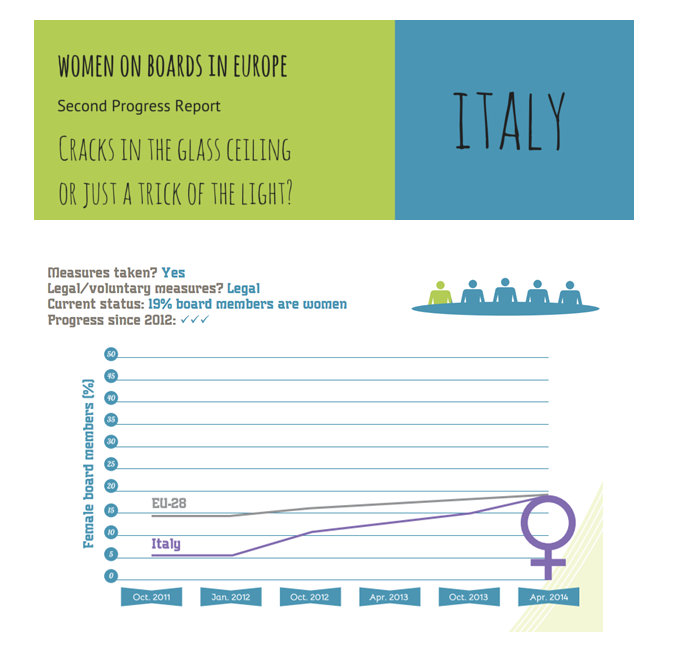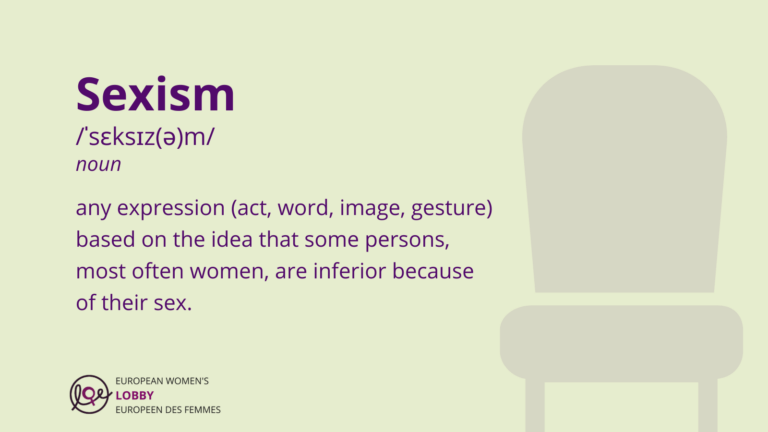What is this report about?
As part of the European Women’s Lobby’s Beijing+20 focus month on ‘Women in Decision-Making’, February sees the launch of the EWL’s latest report on women on boards, entitled ‘Women on Boards in Europe: Second Progress Report. Cracks in the glass ceiling or just a trick of the light?’
This Second Progress Report is part of the EWL’s ongoing work to ensure that parity at all levels of decision-making becomes reality. It tracks developments, progress, and stagnation regarding women on company boards in 11 European countries, including Italy, since the EWL’s first Progress Report on Women on Boards in 2012 – which was awarded the European Public Affairs Award for Report of the Year 2012.
What’s happening in Europe regarding women on boards?
Since the 2012 report, and ongoing campaigning in favour of binding legislation regarding gender parity on company boards across the EU, an EU Directive which aims to attain a 40% gender balance on non-executive boards in large, publicly listed companies across the EU has been proposed and is currently under consideration by the Council. Commissioner for Gender Equality Věra Jourová has committed to seeing the Directive passed within 2015.
We therefore find ourselves at a key moment to reflect on the developments in this area since 2012 across Europe and to learn from this reflection and analysis in order to best inform current and future policy-making in this area.
What has Italy done to crack the glass ceiling since 2012?
Positive steps
- There has been a sharp increase in the proportion of women on company boards – now Italy is at the EU-28 average, while at the time of the 2012 EWL report only three EU-28 countries had lower levels of women on boards
- This is due to Italy’s 2011 Gender Parity law, which fixed a gender quota of 20% by 2012 and 33% in the second and third renewals of board positions among state-owned companies and companies listed on the stock exchange
- Strict sanctions mean that there is high motivation to meet new requirements; the Italian Securities and Exchange Commission (CONSOB) can change the composition of companies’ boards and fines of up to €1m are possible
Challenges
- Italy fell short of meeting the 2012 target of 20% of board positions being filled by women
- Lack of application of sanctions and the temporary nature of the legislation (it is due to expire after the third renewal of the board) raise concerns about whether the targets will actually be reached and moreover, maintained
- Women on Italian boards are disproportionately concentrated in non-executive board positions and female CEOs are few and far between: according to the latest national data, female CEOs account for 3.2% of total female directorships
EWL Member Statement
‘Female representation on the boards of listed companies has increased in the last two years thanks to law 120/11, which established the minimum quota of one third for the gender in minority as an ordinary rule to observe in appointments. Further improvements will be possible if the sanctions system is effectively applied. Currently we have no indications about the use of this, although it is true that this period can be considered one of adjustment. It is, however, desirable that the measure of quotas be transformed into a definitive rule instead of a provisional one to ensure that ‘the new’ becomes usual behaviour and the sanctions system is more effective. The adoption of the proposed EU directive may function as a good basis for the consolidation of gender-sensitive measures at the national level.’
Siusi Casaccia, Italian Coordination for the European Women’s Lobby, Italy
The way forward
The report makes five evidence-based recommendations, which should be taken into account as the future policy landscape regarding women in decision-making at the EU level and the national level is determined:
- Binding measures must apply to both executive and non-executive boards
- Further action is needed to increase proportion of female CEOs
- Effective measures require regular monitoring and intermediary targets
- Measures must be enforced with firm sanctions
- Quotas must be introduced as part of a comprehensive policy package that seeks to address the fundamental causes of women’s underrepresentation in economic decision-making
Gender parity in positions of economic power is of vital importance when it comes to justice, democracy and sustainable growth. Diverse decision-makers and leaders better represent, better understand, and better respond to the desires and needs of women and men in their diversity – and will be more open to cultivating a new style of leadership which will lead to much-needed transformative social change. As an important step forward towards a progressive, sustainable and inclusive Europe, the European Women’s Lobby demands the adoption and implementation of the current proposed EU Directive on women on boards without further delay. Moreover, we strongly encourage national governments to go above and beyond its requirements and to implement stronger measures to achieve gender parity at all levels of decision-making.
Sources: European Union, 2014. The Policy on Gender Equality in Italy.
CONSOB 2013. 2013 Report on corporate governance of Italian listed companies. P12



